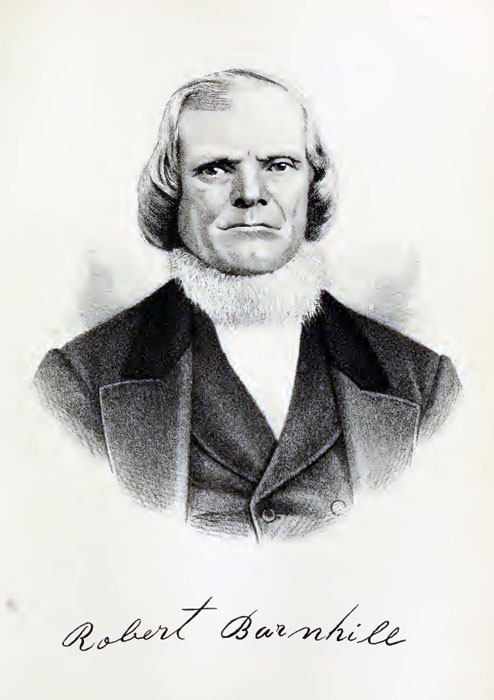|
WASHINGTON received its name in honor of the
commander-in-chief of the Revolutionary armies
and first President of the United States.
It is the northeast subdivision of Hancock
County, and was erected Mar. 5, 1832, embracing
the full Congressional Township 2, north, Range
12 east, or an area of 23,040 acres. Wood
and Seneca Counties bound Washington on the
north and east respectively, while Big Lick
Township lies on the south and Cass on the west.
In 1840 it contained a population of 830; 1850,
1,222; 1860, 1,662; 1870, 1,579, and 1880,
1,945.
Like the greater portion of Hancock County, Washington
was covered originally with a heavy growth of
forest, which through the past half century has
gradually disappeared under the magic strokes of
the woodsman's ax. Much beautiful timber
was cut down and burned during the earlier years
of settlement, as the pioneers never dreamt the
time, would come when those giant trees would be
more valuable than the lands which bore them up.
When the early settlers came to this part of the
county, a windfall from one half a mile to a
mile in width, overgrown with underbrush and
rank vegetation, stretched about half way across
the township from west to east, a little south
of the center, which was named "Wildcat
Thicket," because of the large number of those
animals which then found refuge there.
The soil and topographical features are very favorable
to agricultural pursuits. Two ridges,
composed of sand and gravel, cross the northern
tier of sections from east to west, and unite on
Section 5, thence continue westward into Cass as
one ridge. On each side of the north ridge
the soil is a rich black loam. A row of
springs, locally called "Spring Row," originally
stretched along the base of the north ridge,
rendering the lands wet and marshy, but tile
draining has long since brought them under
cultivation. South of the lower ridge the
soil is a heavy clay interspersed with sections
of vegetable deposits, usually called "black
muck," the higher lands being composed of a
mixture of clay and sand. The surface is
generally level, and inclines gently northward,
the water-shed being wholly in that direction.
Along the streams the country is slightly
rolling, and on reaching the summit of the north
ridge the fall toward the Wood County line is
more rapid.
The East and Middle Branches of Portage River drain the
township from south to north. The Middle
Branch, also called Arcadia Creek, rises south-
Page 503 -

ROBERT BARNHILL
Page 504 - BLANK PAGE
Page 505 -
east of Arcadia, winds northward through the
western portion of the township, passing through
that village in its route, and leaves the county
in Section 6. It receives several small
tributaries in its passage through Washington,
and drains about two-thirds of the township.
Where it crosses the ridge its bluffs are from
twenty to thirty feet in height. The
headwaters of the East Branch, or Fostoria
Creek, are in the east part of Big Lick
Township, whence it flows northward into
Washington, and winding up the east side of the
township, strikes the Wood County line at
Fostoria. These branches afford good
natural drainage, and therefore add much to the
agricultural advantages of the township.
Early Settlers. - It is an admitted
fact that JOHN GORSUCH was the first
settler, and erected the first cabin in this
township, in April, 1831, on the northeast
quarter of Section 1, entered by him Dec. 17,
1831, on the ..............
JAMES SWANEY
JAMES G. WISEMAN
JOHN NORRIS
Page 506 -
In
the fall of 1831, THOMAS KELLEY, of Wane
County, Ohio, built his ............
Quite
a large number of families came into the
township in 1832, among whom were ELIJAH and
JOHN McRILL, FRANCIS REDFERN, JACOB HEISTAND,
MICHAEL and LIVERTON THOMAS, OLIVER DAY, DAVID
HEASTON, OBEDIAH HUNT, JAMES CONLEY, WILLIAM
NORRIS, JAMES BRAN and ISAAC WISEMAN.
The McRILLS came here from Richland
County, Ohio ...........................
MICHAEL THOMAS and
wife,
Page 507 -
The
year 1833, brought into the township WILLIAM
ECKELS, CALEB ROLLER, ELIJAH R. ANDERSON,
WILLIAM DAY, WILLIAM FOX and ROBERT HALES.
Mr. Eckels and his wife
....................
CHARLES E. JORDAN
Page 508 -
RANDLE AND ANN HALES were natives of
Maryland, whence they removed ...............
BAKER HALES came from Brooke County, Va., in
the spring of 1834, and ............
GRAFTON BAKER and WILLIAM FERRALL
also came in 1834. The former was.
..............
Other
settlers of 1834 were JOHN WICKARD, PETER
FULK and MARTIN HENRY, JOHN and DAVID
BROWN. MR. WICKARD and wife,
ELIZABETH, settled on .................
In
March, 1835, PETER and ELIZABETH WYANT
...................
In
1834 or 1835 three brothers, EPHRAIM, AMBROSE
and DAVID PETERS, natives of Virginia,
settled on the site of Arcadia, and
...................
Page 506 -
Churches. - i
Educaton. -
Page 507 -
Early Election and
Justices -
Risdon and
Arcadia -
Page 511 -
|

![]()
![]()
